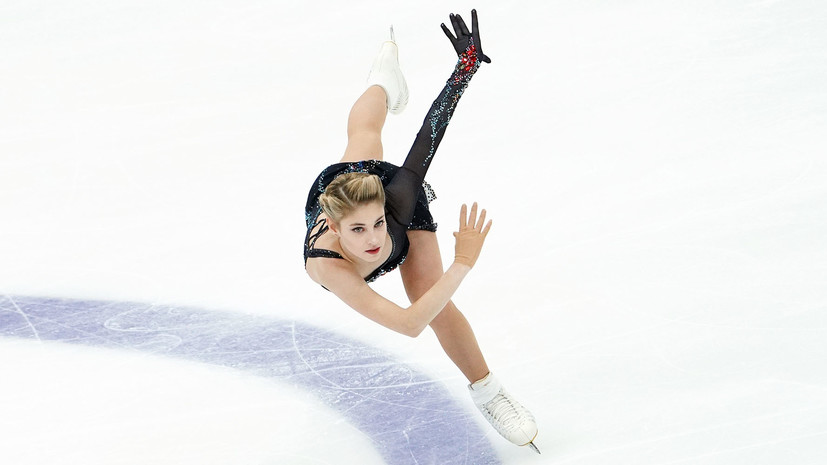During the years of her active coaching, Tatyana Tarasova loved to repeat to her students: "Do what you must, and come what may."
The current truncated-crumpled season, during which coaches and athletes are unable to plan their own lives further than a week in advance, seems to make this phrase their motto.
As well as teach us all to enjoy the little things.
For example, the fact that “Megasport” still managed to hold the Grand Prix stage, even if it is a stretch to call it international.
The sudden withdrawal from the tournament due to illness of the two-time champion of Russia Anna Shcherbakova significantly hit the expectations of the fans: it was planned that the three strongest figure skaters of the country last season - Shcherbakova, Alena Kostornaya and Alexandra Trusova - would meet in Moscow.
But the tournament still became the main event of the evening.
Despite the fact that the best result remained with Kostornaya, in terms of eventfulness, it should be noted that Trusova's next attempt to perform a triple axel (unsuccessfully) and the same jump performed by Elizaveta Tuktamysheva, who was just right to be recognized as the best triple axel of the season.
In terms of mastering new jumps and restoring old ones, the Moscow stage of the Grand Prix turned out to be an ideal start: there is no usual hassle, since there are not a lot of serious rivals and there is no need to be selected anywhere, which means that you can afford to hold these competitions in a training mode, as another stage preparation for the December national championship.
On this occasion, Kostornaya spoke well in the mixed zone, noting that she does not yet pursue the goal of making the programs as complicated as possible.
She commented on her performance as follows: “I will not say that I am satisfied with the performance itself.
The estimates are good, but there is work to do.
It's not just a triple axel.
We will not try it yet.
Why show an element if it's not quite ready?
We need to show programs with the current jumps and not jump out of our pants, ”Kostornaya told reporters.
Tuktamysheva also hurried to warn that in a free program one should not expect a jump in four turns from her, which the skater successfully completed in one of the final training sessions.
So in terms of ultra-si on Saturday, it seems, only Trusova will be the soloist, very annoyed that she once again failed to cope with the triple axel in the short program.
“I don't know why the jump didn't work out.
In training and during the warm-up, everything worked out.
I will work harder, as always, ”Alexandra told reporters.
Five athletes representing Belarus, Azerbaijan, Estonia, Georgia and Armenia (Victoria Safonova, Ekaterina Ryabova, Eva-Lotta Kiibus, Alina Urushadze and Anastasia Galustyan) eventually took 7-11th places.
Foreign representation for single men was reduced to three athletes: Maurice Kvitelashvili (Georgia), Vladimir Litvintsev (Azerbaijan) and Alexander Lebedev (Belarus).
The first of them became the author of the main sensation: for the program with two quadruple jumps (sheepskin coat and salchow), he scored the highest total of points among all participants (99.56), while his best result in the short program was 89.94 before the start of the competition.
It was quite unexpected that Pyotr Gumennik rose to the second place, bypassing the world championship medalist Mikhail Kolyada and European champion Dmitry Aliev.
Kolyada remained third - he did not cope with the quadruple sheepskin coat, Aliyev did not cope with the triple axel and so far has the fifth result.
The paradox, but it seems that the leaders of the Grand Prix tournament is given psychologically harder.
For those who cannot yet boast of serious experience in international performances, the very fact of starting at such a major tournament is an event.
And that means courage.
But what kind of courage can those who are accustomed to a completely different competition have?
How are the same Victoria Sinitsina and Nikita Katsalapov in ice dancing?
The couple, who returned to performances after a break due to a partner's injury, finished the rhythm dance with a record score of 91.13 points (at the 2020 European Championships, where Victoria and Nikita were the first, they scored 88.73), but, in fact, it was a training session without stress and fear of making a mistake.
Formally, the result shown by the skaters on Friday could be considered a world record.
However, this "holiday" for the skaters was spoiled by the International Skating Union, which announced in advance that, due to the special format of the Grand Prix, this season no records will be recorded at this tournament.
The second result was shown by Tiffany Zagorski and Jonathan Gureiro (84.46), who, in turn, bypassed Anastasia Skoptsova and Kirill Alyoshin (79.75), but the difference in points is quite clear to understand: Sinitsina and Katsalapova are not included in the league. even the best of the Russian duets left behind.
Four couples represented Ukraine, Hungary, Lithuania and Belarus, but they all settled down in the second half of the standings.
In pair skating, as at the recent stage of the Russian Cup in Kazan, the whole struggle boiled down to a confrontation between two duets Tamara Moskvina and Artur Minchuk: European champions Alexandra Boykova and Dmitry Kozlovsky and the winners of the junior world championship Anastasia Mishina - Alexander Gallyamov. Boykova - Kozlovsky received a penalty point for the delay in time, but even if this had not happened, they would still have remained second, losing only a fraction of a point to their rivals.

